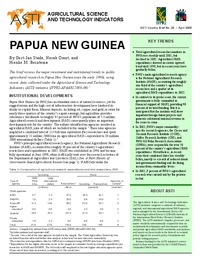Authors:
Stads, Gert-Jan; Omot, Norah; Beintema, Nienke
Year:
2005
Publisher
International Food Policy Research Institute (IFPRI); and National Agricultural Research Institute (NARI)
Back to:
Total fte agricultural researcher numbers in PNG rose steadily until 2001 and thereafter contracted as a result of restructuring and retrenchment of less productive staff. The country’s agricultural R&D expenditures followed a more erratic trend. NARI struggled in its first years of operation, but a change in government brought renewed support and a commitment to ongoing funding. NARI is now expected to be able to draw important foreign donor projects and generate substantial internal revenues from its activities in the years to come.
In contrast to many other developing countries, PNG has a healthy nonprofit sector in agriculture comprising three agencies that focus on commodity-specific research. Although this sector represented the largest in terms of both researcher numbers and expenditures in 2002, its spending has steadily fallen in recent years. CCRI and CRI in particular experienced reductions in their funding from the national government, foreign donors, and commodity levies.
Other factors that set PNG apart from many other developing countries are the limited research role played by its higher-education sector, and the accompanying larger role played by the private sector.

